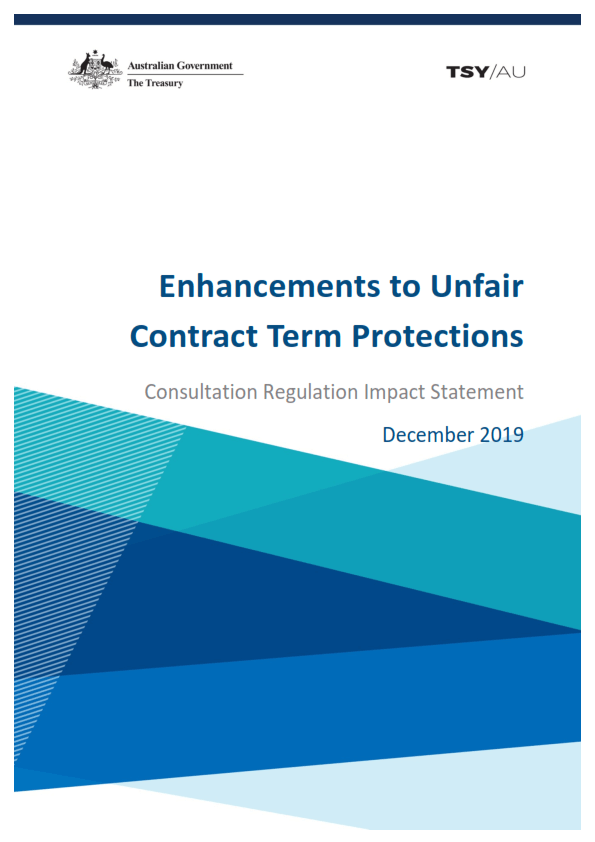Careful consideration should be made when assessing the proposed amendments to Unfair Contract Term Protections. Could they affect your business? Should you be submitting a response to the Government's Consultation Paper?
Since 2016, the Australian Consumer Law has provided protection for small businesses against “unfair contract terms” and, in recent years, the ACCC has successfully taken enforcement action to protect small businesses in a range of industries. The Commonwealth Government has released a Consultation Regulation Impact Statement in relation to enhancing the unfair contract terms regime, which contains proposals that, if adopted, will significantly impact many businesses. Interested parties have until 16 March 2020 to make submissions to the Government in response to their paper. You may wish to consider the practical impact of these proposed amendments on your business and whether it is appropriate to make a submission.
Current Legislation
The unfair contract terms legislation (“UCT law”) applies where:
- the contract is a “standard form” contract;
- at the time the contract is entered into, at least one party to the contract is a business that employs fewer than 20 persons; and
- the upfront price payable under the contract does not exceed $300,000, or $1 million if the contract runs for more than 12 months.
A term is unfair if it:
- causes a significant imbalance in the parties’ rights and obligations under the contract;
- is not reasonably necessary to protect the legitimate interests of the party who would be advantaged by the term; and
- would cause detriment (financial or otherwise) to a party if it were to be relied upon.
Under the UCT law, courts may declare terms of contracts they deem ‘unfair’ to be void.
Shortfalls
A 2018 Government Discussion Paper suggested that the UCT law, as it stands, does not provide small businesses with adequate protections.
The main concerns included:
- unfair contract terms (“UCTs”) continuing to be used in small business contracts as the legislation does not prohibit their use and only renders the UCT void;
- the remedy (i.e. declaring the term void) sometimes being against the interests of the small business adversely affected by the UCT;
- some small businesses being excluded from the protection due to the low thresholds in the criteria (examples might include those in the agriculture sector, which are typically capital intensive); and
- the definition of a “standard form contract” lacking clarity, leaving small businesses unaware of whether the contract is protected under the legislation.
In addition, there are many circumstances where it is unclear whether a term of a contract may be unfair: what is unfair in one contract, or in a particular industry, may not be unfair in another. Further, whether a pro-forma contract which is negotiable is ‘standard form’ is another common question.
Proposed Changes
To address some of these shortfalls, and reduce the prevalence of UCTs, the following amendments to the UCT law have been raised for discussion in the Consultation Regulation Impact Statement:
- introducing a civil pecuniary penalty for the use of UCTs;
- giving courts flexibility to determine an appropriate remedy, such as a variation of the term, instead of UCTs being automatically declared void;
- increasing (or removing) the monetary threshold for contracts which will be the subject of the UCT law;
- creating a rebuttable presumption where a contract term could be declared unfair if, in a separate case, the same or a substantially similar term has been used in the same industry and declared by a court to be unfair; and
- including ‘repeat usage’ of a contract as a factor a court must consider in determining whether a contract is a ‘standard form’ contract.
Significance
Some of the options for reform of the UCT law raised in the Consultation Regulation Impact Statement are very significant. In particular, in the context of legislation that is already very “grey”:
- the proposal to increase the contract value threshold would bring many more contracts within the UCT law regime. Larger contracts are generally given more attention before signing and are more heavily negotiated, so arguably this would amount to “over regulation”; and
- giving the courts the power to impose monetary penalties for UCTs and changing the onus of proof where a similar term has been declared to be unfair in other circumstances in the same industry could have the practical effect of significantly increasing the risk of a party “driving a hard bargain”, even though the object of the legislation is not to penalise genuine negotiation.
One could argue that the proposals further encroach on the freedom of parties to contract. Contracting parties will be required to lean on their lawyers even more than they currently do because it will become very risky to sign any standard form, small business contract without a legal review.
Submissions Sought
The Government requests submissions in response to the options for reform it raises for discussion.
The proposed amendments have the potential to substantially expand the number of business dealings which will become subject to UCT law and increase the complexity and risk in contracting.
You should consider whether the proposals may impact on your business and whether you would like to make submissions in response to the Government’s Consultation Paper.
Submissions are due on 16 March 2020.
Contact Us
Please contact Lisa Calabrese or Will Taylor if you have questions regarding the UCT law or the proposed changes or if you would like assistance with a review of your contracts or your submission to the Government.
This Alert is intended as general information only. It does not purport to be comprehensive advice or legal advice. Readers must seek professional advice before acting in relation to these matters.




